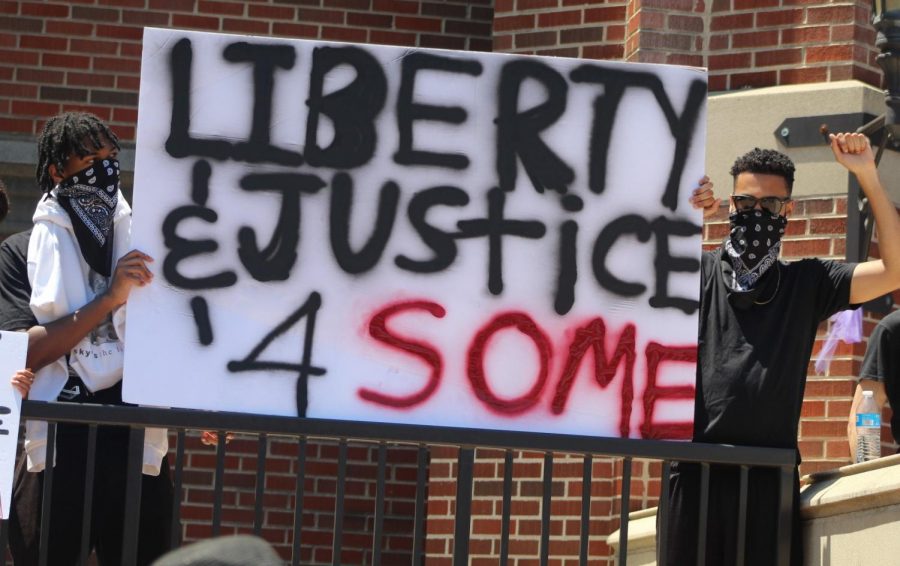This photo was taken by @wardup.photos in March in Downers Grove.
Letter to the editor: Part III from former DGS students
In reaction to the recent events in Kenosha, our superintendent sent our community an email.
“The staff in District 99 is dedicated to leading through our own actions; we will continue to identify and remove practices in our own school community that target and restrain the progress of students based on who they are,” Thiele said.
However, if we are going to recognize racism in any meaningful manner, we must recognize it as a systematic, pervasive issue as all-encompassing as the air we breathe.
The fact is most people develop instinctual reactions to those of different races starting from as early as 6 months old. As early as 2 years old, children begin to use race to explain others’ behaviors. As early as 4 years old, children begin to develop a strong sense of racial bias.
Further, these racial biases aren’t even reflective of the parent’s belief system. This has lead researchers to believe that possibly we develop this bias in the process of making in-groups and out-groups in order to protect ourselves.
Children are primed to solve the puzzle that is the world around them. As it currently stands, racial discrepancies exist in almost every single institution in this country. Reinforced by messages in the media, children develop a strong sense of who is “good” or “bad”, and whose in such groups are split along racialized lines.
By the time a student is in high school, they’ve been indoctrinated into a society with a racial hierarchy which by all metrics Black, Latinx, and Indigenous people are at the bottom.
Unfortunately, our district through the layers of disciplinary restrictions keeps students of these racial backgrounds stuck there.
Furthermore, it would be irresponsible for us to talk about these racial issues without also going so far as to recognize more intersectional issues.
One common excuse from school officials and teachers on why certain policy changes regarding many issues of systemic oppression from racism to homophobia to sexism aren’t being implemented is that the staff don’t know what the atmosphere of the school is unless students report things to them.
However, to that, we’d like to pose the question, do the students at District 99 have much reason to trust the district to respond seriously to their oppression?
With regards to sexual assault and harrassment, does the school have clear and specific procedure that allows victims to be properly informed of the procedings following a report and be empowered to make one regardless of whether the perpetrator was faculty member or another student? And is that procedure public information?
Do the sex education classes include information on what Title IX is and how to file complaints? Further, do the sex education classes include any information that goes beyond a heteronormative standard to apply to LGBTQ students?
Is access to classroom accommodations simple and relatively quick to undertake as to not greatly burden the student’s academic performance during the application process?
Does the district have teachers inform students on how to air grievances about unfulfilled accommodations in classrooms within the class syllabus so that that information is easily accessible?
Do both first-generation students (first-generation American and/or whose parents did not attend a college or university) have access to mentorship and college preparation programs they can access without significant financial burden? Are these programs still accessible across various levels of college selectivity they plan on undertaking? And are these programs that the school actively endorses and informs students of?
Are students at any point in their education taught about how to use federal or state laws to protect themselves from discrimination within or outside of the classroom?
The answer to all of these, as far as we are aware, is no. And that’s an issue.
District 99 can not say that more security guards, more bullet-proof glass, and more layers added to entrances with more locks are the only thing that they can implement to protect students when students are regularly facing violence within their walls.
District 99 fails to protect students from all kinds of violence committed to their race, gender, sex, sexuality and rights. There are always things that the district can implement to heal from our past and present institutional failures and work towards equality and justice.
In reaction to the recent events in Kenosha, our superintendent sent our community an email.
“In District 99 we expect our staff and students to value and respect each other, and we show this working to improve the world for everyone. This is the only way we can continue to build for a better and more caring future for all of us,” Thiele said.
Let’s make sure our district actually works on making that true.
